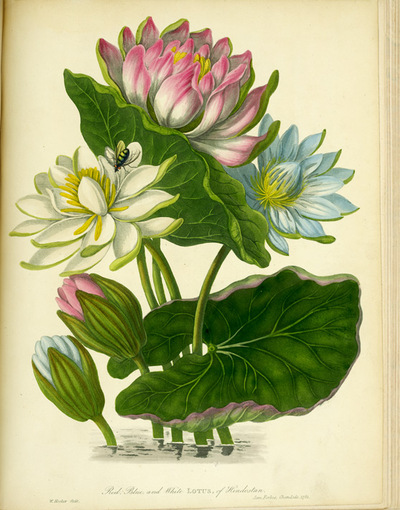Javascript must be enabled to continue!
Red, blue and white lotus, of Hindostan
View through Europeana Collections
Plate eighty-eight from the third volume of James
Forbes' "Oriental Memoirs". Forbes (1749-1819) was a keen observer
of nature, often making drawings of every interesting plant or
animal he came across during his travels in India. Forbes wrote,
'These water lilies were drawn and coloured from Nature...they
almost cover the Indian Lakes. When gently agitated by the breeze,
they give them a beauty and freshness not easily conceived by the
inhabitants of a colder climate.'
Title: Red, blue and white lotus, of Hindostan
Description:
Plate eighty-eight from the third volume of James
Forbes' "Oriental Memoirs".
Forbes (1749-1819) was a keen observer
of nature, often making drawings of every interesting plant or
animal he came across during his travels in India.
Forbes wrote,
'These water lilies were drawn and coloured from Nature.
they
almost cover the Indian Lakes.
When gently agitated by the breeze,
they give them a beauty and freshness not easily conceived by the
inhabitants of a colder climate.
'.
Related Results
Emperor Leopold I elevates Mark Putz von Adlersthurn, court chamber council and secret secretary, to the old knight’s state, improves his coat of arms and improves his predicate on von Putz zu Adlerßthurn and grants him a new predicate Edler von Schrotten
Emperor Leopold I elevates Mark Putz von Adlersthurn, court chamber council and secret secretary, to the old knight’s state, improves his coat of arms and improves his predicate on von Putz zu Adlerßthurn and grants him a new predicate Edler von Schrotten
Character: description on folk. 5b and 6a, miniature on folk. 5a, 166 x 151 mm.
Quarter shield with crowned heart plate. It is red with a silver crossbar, above the crossbar is the...
Woven shawl with a ground of silk and wool, probably made in Paisley, Scotland, 1825-1830. Woven shawl with a ground of white silk and wool. With a pattern of decked-edged stripes alternately red, containing a stem of small blue flowers, and parti-coloure
Woven shawl with a ground of silk and wool, probably made in Paisley, Scotland, 1825-1830. Woven shawl with a ground of white silk and wool. With a pattern of decked-edged stripes alternately red, containing a stem of small blue flowers, and parti-coloure
Woven shawl with a ground of silk and wool, probably made in Paisley, Scotland, 1825-1830. Woven shawl with a ground of white silk and wool. With a pattern of decked-edged stripes ...
Fickur med châtelaine samt etui
Fickur med châtelaine samt etui
Of gold with enamel, miniature painting, oriental pearls and jargons, dial of enamel, works with s. k. spider canal. Bottom shell convex. On this in cover enamel a figure scene in ...
Emperor Ferdinand II elevates Jan the Elder Pacht, a town town of Hříuje uje uje uje, to the Czech Vladycký state, awards him a coat of arms and a predicate from Raijov
Emperor Ferdinand II elevates Jan the Elder Pacht, a town town of Hříuje uje uje uje, to the Czech Vladycký state, awards him a coat of arms and a predicate from Raijov
Character: description, miniature in the middle of the leaf, 109 x 128 mm.
In the red - blue obliquely divided gable, a golden double-tailed lion with a red tongue holding a silver...
Lotuses and Birds
Lotuses and Birds
Painted with ink and colored pigments on paper, this magnificent eight-panel folding screen boasts a continuous scene of a lotus pond with tall, luxuriant stalks of lotus flowers, ...
portrait from "[Indian Antiquities: or, Dissertations relative to the ancient geographical divisions, the ... primeval theology, the grand code of civil laws, the original form of government, and the ... literature of Hindostan, compared ... with the reli
portrait from "[Indian Antiquities: or, Dissertations relative to the ancient geographical divisions, the ... primeval theology, the grand code of civil laws, the original form of government, and the ... literature of Hindostan, compared ... with the reli
This image has been taken from scan 000598 from volume 01 of "[Indian Antiquities: or, Dissertations relative to the ancient geographical divisions, the ... primeval theology, the ...
Powder bag and powder horn
Powder bag and powder horn
Engesle textThis powder bag; 1860-1870Hide, wool, glass, cow horn, wood; bag: h. 20.5 cm., w. 18 cm.\nRMV 710-7; Herman Ten Kate collection; purchased from Niagara Falls trader, 18...




